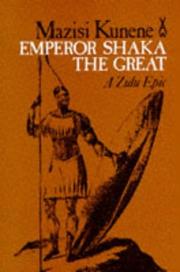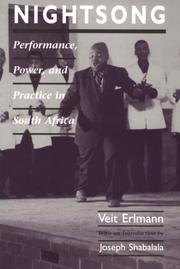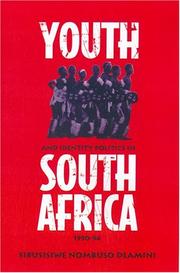| Listing 1 - 10 of 12 | << page >> |
Sort by
|
Book
ISBN: 1868251799 Year: 1991 Publisher: Cape Town Struik Publishers
Abstract | Keywords | Export | Availability | Bookmark
 Loading...
Loading...Choose an application
- Reference Manager
- EndNote
- RefWorks (Direct export to RefWorks)
Zulu (African people) --- Amazulu (African people) --- Isizulu (African people) --- Kafirs (African people) --- Zulus --- Zunda (African people) --- Pictorial works --- Zulu [culture or style] --- antropologie --- Africa --- Ethnology --- Nguni (African people)

ISBN: 0435902113 0435906488 Year: 1979 Publisher: London Heinemann
Abstract | Keywords | Export | Availability | Bookmark
 Loading...
Loading...Choose an application
- Reference Manager
- EndNote
- RefWorks (Direct export to RefWorks)
Shaka [King] --- Epic poetry, Zulu --- Kings and rulers --- Zulu (African people) --- Shaka, --- Amazulu (African people) --- Isizulu (African people) --- Kafirs (African people) --- Zulus --- Zunda (African people) --- Ethnology --- Nguni (African people) --- Chaka, --- Shaka kaSenzangakhona, --- Shaka Zulu, --- Tshaka, --- U-Shaka, --- Great Elephant,
Book
ISBN: 1316083357 1316057356 1316054985 1316080994 1316076261 1107428025 1139871684 1316071537 1316078639 1316073890 1107075327 1322293147 Year: 2014 Publisher: Cambridge : Cambridge University Press,
Abstract | Keywords | Export | Availability | Bookmark
 Loading...
Loading...Choose an application
- Reference Manager
- EndNote
- RefWorks (Direct export to RefWorks)
This scholarly account traces the emergence of the Zulu Kingdom in South Africa in the early nineteenth century, under the rule of the ambitious and iconic King Shaka. In contrast to recent literary analyses of myths of Shaka, this book uses the richness of Zulu oral traditions and a comprehensive body of written sources to provide a compelling narrative and analysis of the events and people of the era of Shaka's rule. The oral traditions portray Shaka as rewarding courage and loyalty and punishing failure; as ordering the targeted killing of his own subjects, both warriors and civilians, to ensure compliance to his rule; and as arrogant and shrewd, but kind to the poor and the mentally disabled. The rich and diverse oral traditions, transmitted from generation to generation, reveal the important roles and fates of men and women, royal and subject, from the perspectives of those who experienced Shaka's rule and the dramatic emergence of the Zulu Kingdom.
Zulu (African people) --- Amazulu (African people) --- Isizulu (African people) --- Kafirs (African people) --- Zulus --- Zunda (African people) --- Ethnology --- Nguni (African people) --- Kings and rulers --- History --- Shaka, --- Chaka, --- Shaka kaSenzangakhona, --- Shaka Zulu, --- Tshaka, --- U-Shaka, --- Great Elephant, --- Zululand (South Africa)
Book
ISBN: 1856492087 1856492079 Year: 1993 Publisher: London Zed
Abstract | Keywords | Export | Availability | Bookmark
 Loading...
Loading...Choose an application
- Reference Manager
- EndNote
- RefWorks (Direct export to RefWorks)
Ethnicity --- Zulu (African people) --- Amazulu (African people) --- Isizulu (African people) --- Kafirs (African people) --- Zulus --- Zunda (African people) --- Ethnology --- Nguni (African people) --- Ethnic identity --- Group identity --- Cultural fusion --- Multiculturalism --- Cultural pluralism --- Inkatha (Organization : South Africa) --- Inkatha Yenkululeko Yesizwe --- National Cultural Liberation Movement (South Africa) --- Inkatha Freedom Party --- Kwazulu (South Africa) --- Kwa Zulu (South Africa) --- KwaZulu-Natal (South Africa) --- Politics and government.
Book
ISBN: 0803284535 0803284551 9780803284531 9780803284555 0803284543 9780803284548 9780803278639 0803278632 9780803284548 Year: 2016 Publisher: Lincoln
Abstract | Keywords | Export | Availability | Bookmark
 Loading...
Loading...Choose an application
- Reference Manager
- EndNote
- RefWorks (Direct export to RefWorks)
Zulu (African people) --- Dakota Indians --- Nadowessioux Indians --- Naudowessie Indians --- Nawdowissnee Indians --- Sioux Indians --- Wahpakoota Sioux Indians --- Indians of North America --- Siouan Indians --- Amazulu (African people) --- Isizulu (African people) --- Kafirs (African people) --- Zulus --- Zunda (African people) --- Ethnology --- Nguni (African people) --- Government relations --- Cross-cultural studies. --- Wars --- History
Book
ISBN: 0620205814 Year: 1996 Publisher: Durban Local History Museums
Abstract | Keywords | Export | Availability | Bookmark
 Loading...
Loading...Choose an application
- Reference Manager
- EndNote
- RefWorks (Direct export to RefWorks)
South Africa --- Zoulou (Peuple d'Afrique) --- Zulu (African people) --- Culture matérielle --- Expositions --- Material culture --- Exhibitions --- Kwazulu Cultural Museum (Ulundi, Kwazulu-Natal, South Africa) --- Local History Museums (Durban, South Africa) --- Local history Museums (Durban, South Africa) --- Culture matérielle --- Amazulu (African people) --- Isizulu (African people) --- Kafirs (African people) --- Zulus --- Zunda (African people) --- Material culture&delete& --- Durban (South Africa). --- Inzinqolobane Zezomlando Wesifunda --- Exhibitions. --- Ethnology --- Nguni (African people)

ISBN: 0226217205 0226217213 Year: 1996 Publisher: Chicago (Ill.) : University of Chicago press,
Abstract | Keywords | Export | Availability | Bookmark
 Loading...
Loading...Choose an application
- Reference Manager
- EndNote
- RefWorks (Direct export to RefWorks)
Isicathamiya --- Zulu (African people) --- Folk music --- Folk songs, Zulu --- Zulu (Peuple d'Afrique) --- Musique folklorique --- Chansons folkloriques zouloues --- History and criticism. --- Music --- Histoire et critique --- Musique --- #SBIB:39A5 --- #SBIB:39A73 --- #SBIB:309H142 --- Kunst, habitat, materiële cultuur en ontspanning --- Etnografie: Afrika --- Populaire muziek: functies, muziekgenres, historiek --- Amazulu (African people) --- Isizulu (African people) --- Kafirs (African people) --- Zulus --- Zunda (African people) --- Ethnology --- Nguni (African people) --- Ingoma ebusuku --- Zulu folk songs --- Ethnic music --- Traditional music --- Folklore --- History and criticism --- Music&delete& --- 78.32.3
Book
ISBN: 331956787X 3319567861 Year: 2017 Publisher: Cham : Springer International Publishing : Imprint: Palgrave Macmillan,
Abstract | Keywords | Export | Availability | Bookmark
 Loading...
Loading...Choose an application
- Reference Manager
- EndNote
- RefWorks (Direct export to RefWorks)
This book examines the active role played by Africans in the pre-colonial production of historical knowledge in South Africa, focusing on perspectives of the second king of amaZulu, King Dingane. It draws upon a wealth of oral traditions, izibongo, and the work of public intellectuals such as Magolwane kaMkhathini Jiyane and Mshongweni to present African perspectives of King Dingane as multifaceted, and in some cases, constructed according to socio-political formations and aimed at particular audiences. By bringing African perspectives to the fore, this innovative historiography centralizes indigenous African languages in the production of historical knowledge.
Zulu (African people) --- History. --- Historiography. --- Dingane, --- Africa, Southern --- Politics and government --- Amazulu (African people) --- Isizulu (African people) --- Kafirs (African people) --- Zulus --- Zunda (African people) --- Dingaan, --- Dingana, --- Dingane kaSenzangakhona Zulu, --- Ethnology --- Nguni (African people) --- Africa, Sub-Saharan-History. --- History, Modern. --- Social history. --- Civilization-History. --- History of Sub-Saharan Africa. --- Modern History. --- Social History. --- Cultural History. --- Descriptive sociology --- Social conditions --- Social history --- History --- Sociology --- Modern history --- World history, Modern --- World history --- Africa, Sub-Saharan—History. --- Civilization—History.

ISBN: 1442683775 1282029061 9786612029066 9781442683778 0802039111 9780802039118 Year: 2005 Publisher: Toronto : University of Toronto,
Abstract | Keywords | Export | Availability | Bookmark
 Loading...
Loading...Choose an application
- Reference Manager
- EndNote
- RefWorks (Direct export to RefWorks)
"Youth and Identity Politics in South Africa examines the ambiguities, contradictions, and negotiations involved in the participation of Zulu youth in the anti-apartheid struggle and their role in the formation of post-apartheid social identities. The author of the book, Sibusisiwe Nombuso Dlamini, spent four years in Greater Durban, working and talking with youth during the critical period that stretched from 1990 to 1994. Writing primarily about male youth, Dlamini begins her study with a discussion of three main influences on black youth culture: the internal divisions within black culture at large, the resistance of all black groups to the apartheid state, and the split between the political groups, resulting in the creation of the United Democratic Front (UDF), the African National Congress (ANC), and Inkatha."--Jacket
Youth, Black --- Zulu (African people) --- Identity politics --- Amazulu (African people) --- Isizulu (African people) --- Kafirs (African people) --- Zulus --- Zunda (African people) --- Ethnology --- Nguni (African people) --- Identity (Psychology) --- Politics of identity --- Political participation --- Black youth --- Negro youth --- Political activity --- Ethnic identity. --- Politics and government --- Political aspects --- KwaZulu-Natal (South Africa) --- South Africa --- Politics and government. --- Jeunesse noire --- Zoulous --- Activité politique --- Identité ethnique. --- Politique et gouvernment --- Afrique du Sud --- KwaZulu-Natal (Afrique du Sud) --- Politique et gouvernement --- Politique et gouvernement.
Book
ISBN: 1928396011 9781928396017 9781928396024 Year: 2016 Publisher: Durbanville AOSIS
Abstract | Keywords | Export | Availability | Bookmark
 Loading...
Loading...Choose an application
- Reference Manager
- EndNote
- RefWorks (Direct export to RefWorks)
This book will benefit specialists in the field of the education sciences. It represents significant progress in knowledge production. Self-directed learning has become increasingly important, not only for education in South Africa but also for education sciences in the international arena. This is a result of the changing education landscape, caused by the demands of the 21st century as well as the rapid change in knowledge production. Learners should be equipped with skills to take responsibility for their own learning. New innovative strategies should be incorporated into teaching and learning in order to meet the changing demands in education. Traditional teacher-centred practices are still the norm in most South African schools and higher-education institutions and do not adequately prepare students for lifelong learning in the 21st century. The content focuses on the theory behind self-directed learning, explores strategies such as cooperative learning, problem based learning, case-based teaching and large-group teaching that enhance self-directed learning and the use of blended learning in a self-directed learning environment. The book demonstrates how self-directed learning can be enhanced in mathematics, computer-science and life-science education and through the use of student tutors for geography. Digital technology could, for example, also be used in innovative ways for education in isiZulu folk poetry. The findings are based on original empirical research and a sound theoretical-conceptual framework. In an environment of rapidly changing knowledge production, this book responds to the challenge of how to equip learners with the necessary skills to take responsibility for their own learning. The book presents innovative teaching and learning strategies for meeting the changing demands in education. Group activities, the responsibilities of learners and the obstacles that hinder their learning are analysed, and the way in which educators can support them is discussed. Educational values such as mutual trust are discussed, and self-directed assessment is explored. This is a timely collective work authored by experts who subscribe to the approach of self-directed learning. Educators should discover new teaching and learning strategies and value the integration of self-directed learning in the classroom.
Self-managed learning. --- Blended learning. --- Case-based reasoning. --- Group work in education. --- Teachers --- Zulu (African people) --- Education --- Training of. --- Education. --- Amazulu (African people) --- Isizulu (African people) --- Kafirs (African people) --- Zulus --- Zunda (African people) --- Ethnology --- Nguni (African people) --- Teacher education --- Teacher training --- Teachers, Training of --- Cooperative learning --- Group method in teaching --- Group teaching --- Teaching --- Case-based learning --- Reasoning --- Hybrid learning --- Learning --- Self-directed learning --- SML (Self-managed learning) --- Employees --- Organizational learning --- Training of --- large-group teaching --- cooperative learning --- problem-based learning --- academic writing --- case-based teaching --- blended learning --- self-directed learning --- Autodidacticism --- Autonomy --- Mathematics --- South Africa --- Zulu language
| Listing 1 - 10 of 12 | << page >> |
Sort by
|

 Search
Search Feedback
Feedback About UniCat
About UniCat  Help
Help News
News